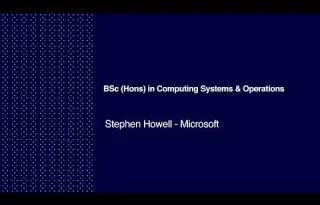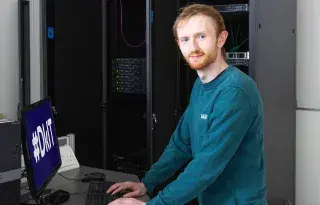BSc (Hons) in Computing Systems and Operations (Software Development and DevOps)

Search to find a different course
Course Overview
This unique degree integrates Software Development with IT Operations, giving students the multi-disciplinary skills necessary to design, build and operate systems in today's highly demanding IT environments. Students learn the principles of Development, DevOps and Platform Engineering, underpinned with in depth knowledge of Networks, Operating Systems and the Cloud.
Students on this course have a strong interest in software and enjoy the more technically focused and systems-driven aspects of Computing. They gain hands-on experience with current industry tools and processes, learn how to work effectively as teams and how to deliver high quality solutions.
This course has been developed in response to the highlighted shortages of skilled ICT graduates locally, nationally and internationally.
What makes this course different
Computing is identified, locally, nationally and internationally, as a key future skill and the demand for Computing graduates with skills in programming and systems continues to grow.
This course will prepare students to work in the computing industry by helping to develop both their personal and professional skills in a supportive, positive, and student-centred environment.
Unique programme that integrates Software Design & Development skills, with knowledge of the Computing Systems on which applications are deployed, and an understanding of the DevOps tools and processes to manage their delivery.
Understanding the Industry
IT professionals have to combine software development skills with knowledge of the environments their applications run on, including systems, networks and production processes. These skills are integrated through a set of software delivery practices known as DevOps – where development and operations are brought together.
IT professionals must have an in-depth understanding of their platforms and have the relevant hard and soft skills to overcome the traditional barriers between software development, QA, and IT operations across the entire software development lifecycle.
Career Opportunities
Graduates will have expertise that cuts across the core disciplines of Development, Systems and Operations, together with an understanding of the processes, tools and mind-set of DevOps. They will have knowledge and competencies in a broad range of subject areas across the domain of Computing, with a DevOps focus on deployment and delivery. Graduates will possess the skillset necessary for modern application delivery, which is increasingly in demand from industry, thus leading to increased employment opportunities and greater occupational mobility.
Future Careers:
- DevOps Engineer
- Software Developer
- Site Reliability Engineer
- Solutions Architect
- Platform Engineer
- Cloud Engineer
- Automation Engineer
- SysOps Engineer
- Automated Testing
- Systems Administrator
Course Delivery and Modules
This course takes an integrative approach, focusing on first building strong foundational knowledge and competencies in Programming, Web Development, System Administration, Networking and Databases, alongside an introduction to the tools, processes and mind-set of DevOps.
Students will then develop their skills much further in software design and development, architecture and networking. Combined with this they will gain in-depth knowledge of software deployment, production management and process automation. Finally, they will learn advanced skills in areas such as micro-services, Cloud Technologies and Software Defined Networks (where modern infrastructure is coded alongside system software). The course includes industry experience in the third year and a year-long project in the fourth year. Throughout, students will gain experience using current industry tools such as Gitlab, Docker, Kubernetes, Terraform and many others.
There is a specific focus on practical and problem-based learning and so much of the programme content is delivered in small 20-student computer labs where students can avail of greater feedback and interaction with their lecturer.
There are numerous support services available within the department to enable and encourage all students to realise their personal and professional potential, in particular the IT Learning Centre.
- Introduction to Programming
- Introduction to System Administration
- Front-End Development
- Computer Hardware
- Mathematics for Computing Systems
- DevOps Lifecycle
- Databases
- Networking
- Communication Skills
- System Testing and Continuous Integration
- Object-Oriented Programming
- Solutions Architecture
- Software Testing
- Routing and Switching
- Operating Systems
- Database Systems
- Introduction to Software Engineering
- Advanced Routing and Switching
- Virtualization
- Deployment
- Algorithms
- Data Structures
- Network Protocols
- Automation
- DevOps Group Project
- Production Process
- Work Placement OR Approved Semester Abroad
- Project
- Programmable Networks
- Web Browser Application Development
- IT Security
- Cloud Infrastructure
- Ethical Issues and Research Practice
- Microservices
- Software Design
- Data Centre Environment
- Data Management
Work placement
In Year 3 students have the option to complete a 15-week work placement or study abroad with Erasmus.
Education Progression
Graduates may progress onto a Level 9 Masters degree.
Fees and Funding
Please find information on fees and funding here: www.dkit.ie/fees
Entry requirements
Standard entry requirements apply. There are no special entry requirements for this course.
- Standard Requirements for Leaving Certificate Applicants
- Standard Requirements for UK/NI Applicants
- Standard Requirements for QQI-Further Education Applicants
- Mature Applicants: Minimum of 23 years of age on January 1st of year of application.
Recent CAO points
How to apply
Apply on CAO
All standard entry first-year applicants must apply for entry through the CAO. See Important application dates for CAO and information for specific applicant types below:
Advanced Entry & Transfer Applications
Advanced Entry is for applicants who have previous educational achievements and/or work experience and want to be considered for direct entry into year 2, 3, or 4 of a course. This includes students looking to transfer to DkIT from another Higher Education provider.
International Application (non-EU)
International Applicants (not from or living in the EU) can apply through an agent or directly to DkIT to study this course.
Ask us a Question
If you have a question about the BSc (Hons) in Computing Systems and Operations (Software Development and DevOps) please ask it below and we will get back to you.
Department Office
Disclaimer: All module titles are subject to change and for indicative purposes only. All courses are delivered subject to demand and timetables are subject to change. Elective Module options will only run subject to student numbers. The relevant Department will determine the viability of each elective module option proceeding depending on the number of students who choose that option. Students will be offered alternative elective modules on their programme should their preferred elective option not be proceeding. Award Options for Common Entry Programmes: The relevant Department will determine the viability of each award option proceeding depending on the number of students who choose either option. If the numbers for one of the Award options exceed available places, students for this option will be selected based on Academic Merit (highest grades).

